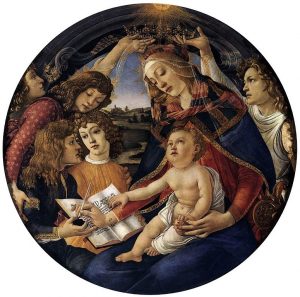Thoughts on Sunday’s Lessons for Dec. 13, 2020
First Reading: Isaiah 61:1-4, 8-11
The third Sunday of Advent is sometimes called Rose Sunday, when it’s traditional to light the pink candle on the Advent wreath. The more festive color marks light in the darkness as our Advent readings turn from the hope and fear of end times and Judgement Day. Now our thoughts move toward the Incarnation, the Messiah, the coming birth of Jesus on Christmas Day.

Madonna of the Magnificat (1483), tempera painting on panel by Sandro Botticelli (1445-1510), The Uffizi Gallery, Florence, Italy. (Click image to enlarge.)
In the first reading, we hear the Prophet Isaiah speaking to the people returning home from exile in Babylon to a devastated Jerusalem. In words that share some of the coventantal themes that we also hear this week in the alternate to the Psalm, the Song of Mary, the prophet declares that God’s good news comes to the poor, the oppressed, captives and prisoners. This is the same passage that Luke’s Gospel says Jesus read in his first visit in the synagogue at Nazareth.
Psalm: Psalm 126
Just as Isaiah told the people in exile of God’s promise that justice and righteousness would be restored, here the Psalmist sings that God’s promise has been fulfilled. God has indeed restored the fortunes of the Temple on Mount Zion, the Psalmist exults. Every verse of this short Psalm contains a shout of laughter, joy, gladness, or praise. God has been good. God has turned the people’s tears into songs of joy; their weeping into a bountiful harvest.
Alternate to the Psalm: Luke 1:46-55 (Canticle 15)
In place of the Psalm assigned for this day we may sing the Magnificat, the beautiful Song of Mary. In this passage from the first chapter of Luke’s Gospel. Mary has just been told by an angel that she will bear the Messiah, and goes to visit her relative, Elizabeth. Elizabeth, pregnant with the child who will be John the Baptist, feels the infant move with joy inside her when Mary comes in. Elizabeth declares Mary the blessed mother of God, full of grace. In response, Mary sings these starkly radical verses that foreshadow Jesus’ own teaching. They are liberating verses that praise a God who scatters the proud, casts down the mighty, and sends the rich away hungry, while filling the hungry with good things.
Second Reading: 1 Thessalonians 5:16-24
Closing his first letter to the Thessalonians, Paul urges the people to be prepared in prayer and rejoicing for Christ’s return. “Rejoice always, pray without ceasing,” he urges the people, telling them to give thanks for all things, stay faithful and be filled with the Spirit. Hold fast to what is good and abstain from every kind of evil, he urges them, so they will be ready, “sound and blameless,” when Jesus Christ returns.
Gospel: John 1:6-8,19-28
This Sunday we hear the story of John the Baptist from the evangelist John. This version, in contrast with Mark’s account, makes no mention of the Baptist’s attire or his dietary preferences, but opens on a tense scene: The Temple authorities, worried about the noisy crowds surrounding him, want to know who John is. He is not the Messiah, nor a new prophet nor Elijah, John says. Rather, he says – quoting from the Isaiah verses that we heard last week – he is the voice of the one crying out in the wilderness, calling on the people to make straight the way of the Lord. He baptizes with water, John says, not for his own sake but to make way for the one who is coming after him, who is so much greater than John that John is unworthy to untie his sandals.
